DC’s Ambassador Theater Takes on Dario Fo’s They Don’t Pay? We Won’t Pay!
Dario Fo’s satirical look at the personal costs of capitalism, They Don’t Pay? We Won’t Pay! was written in 1974 and set in Fo’s native Italy, a country whose economy had been hard-hit by a rise in crude oil prices. From 1973 to 1974, the price of food rose by twenty percent. Meanwhile, the International Monetary Fund, as a condition of granting the Italian government a loan, demanded that the government implement austerity measures. The result: a determined, grassroots resistance, explored to great comic effect in Fo’s play.
On the whole, the play is timeless because the basic question it poses is universal: when faced with injustice, do you capitulate quietly or resist?
Fo, who won the 1997 Nobel Prize for Literature and was praised by the Swedish Royal Academy for emulating “the jesters of the Middle Ages in scourging authority and upholding the dignity of the downtrodden,” has stated thatevery production of this show should be relevant to its time and place. Accordingly, Ambassador Theater has updated some details of the script, including references to Ferguson, Anonymous International, Ben Bernanke, and the bank bailouts. Director Joe Martin has set the play in Newark, New Jersey where working class couples Antonia (Hanna Bondarewska), her husband Giovanni (Daren Marquardt), his best friend Luigi (Mitch Irzinski), and his wife Margherita (Moriah Whiteman) struggle to put food on the table and keep the lights on.
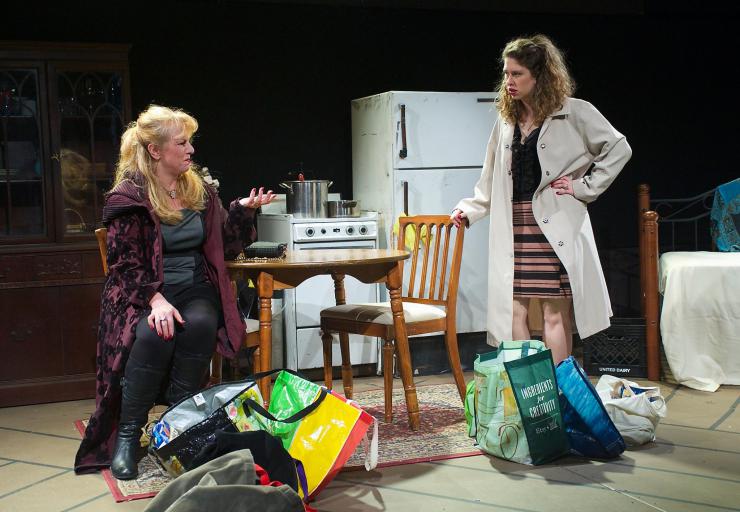
For the most part, Ambassador’s updating of the play works, although the current-day setting jars with some of the script’s clear anachronisms: Margherita’s husband worries that if she becomes pregnant, she will be fired; and the policeman complains that if you strike, you get put in jail, or wind up with a bullet in the head. On the whole, the play is timeless because the basic question it poses is universal: when faced with injustice, do you capitulate quietly or resist?
Fo based the play on a real event: in the early seventies, Italian students, housewives, and average citizens lifted products off the shelves of a grocery store in protest of the high prices, carrying out a mass looting. Police went door to door, searching for the stolen food. They Don’t Pay? We Won’t Pay! which takes its title from a slogan that protesting government workers shouted outside the grocery store (“They don’t pay fair wages, we don’t pay their prices.”), takes as its jumping off point a supermarket raid carried out by women. They go on a rampage throughout the store, stuffing whatever they can grab into bags.
As the play opens, Antonia arrives at her apartment with her friend Margherita in tow. Afraid that her law-abiding husband will throw her out if he finds out she’s stolen food, she hides the goods under the bed and gives her friend Margherita pasta and a jar of olives. Margherita puts them down her shirt and buttons her raincoat over them. Antonia’s husband Giovanni arrives, and there is nothing to do but tell him Margherita is pregnant.
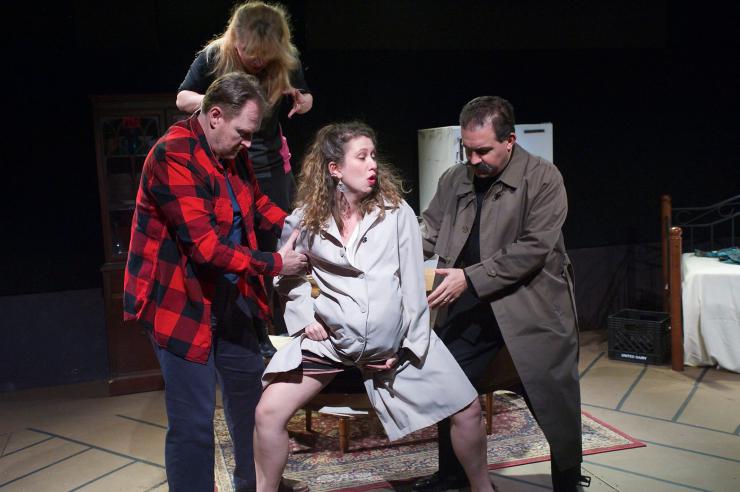
This fib lays the foundation for the many absurd and hilarious situations that follow. Margherita eventually loses her grip on the goods and the jar of olives crashes to the floor and shatters. Giovanni and the policemen who have come to question him hear her scream and come into the kitchen. “What happened?,” he asks.
“Her water broke,” Antonia answers. After the women exit and Giovanni is mopping up, he observes the smell. “We’re marinating in brine for nine months,” he muses, full of wonderment. “Who knew? We’re marinating in olives. If I didn’t know where these came from I’d eat them.” When Margherita’s husband happens by, he does eat them, to Giovanni’s horror.
That scene is a comic highlight, but there are others. In the store, the women grabbed whatever they could lay their hands on, including cat food, frozen rabbit heads (intended to be fed to chickens), and birdseed. Giovanni, who has missed lunch, finds nothing in the kitchen but these items and prepares a rabbit-head birdseed soup. The rabbit head props are a grotesque delight, hovering between horrific and cute. The play becomes more absurd as it progresses, culminating in a scene where the federal inspector who has plagued the families passes out after Antonia hits him on the head. To revive him, she intends to fill his lungs with oxygen, using a tank her husband has for work. It’s on the wrong setting, though, and she fills his lungs with hydrogen. “Look at that belly,” she says. “I knocked up a federal agent.” The agent, for his part, is delirious with joy when he comes to. “My belly! I’m pregnant. I’m going to be a Mommy!” He dances around with the rabbit heads.
Partnering with embassies to bring work from other countries to DC, Ambassador Theater exposes audiences to work they wouldn’t otherwise see.
This is strange fare for DC theatregoers. But that’s what makes Ambassador Theater’s work so important. Partnering with the Italian Cultural Institute, in this case, and with other embassies to bring work from other countries to DC, Ambassador exposes audiences to work they wouldn’t otherwise see. Ambassador’s ultimate goal is to deepen understanding between cultures. It’s a tall order for a small theatre company. Founder and Artistic Director Hanna Bondarewska handles the nitty-gritty, day-to-day tasks of running the company. If you call for a press ticket, you encounter her voice on the other end of the line. You go to see the show that night and she’s in it. In They Don’t Pay? We Won’t Pay! she plays the role of Antonia with great pizazz. Mitch Irzinski (Luigi) is another of the show’s standouts.
While it may be a stylistic outlier, thematically Fo’s play is a perfect fit for Washington. It is a romp with serious implications. By the play’s end, the straight-laced husbands have learned that the factory where they work is being shut down the next day. This is the last straw. They begin stealing food, too, at last agreeing with the policeman whose words at the beginning of the play sounded radical: “Take it and run. That’s your only defense against corporate bandits. These fat-cat pigs who starve, cheat, and rob us—they’re the real thieves.” Banks and corporations are bailed out, he complains. It’s the workers who suffer.
“Little by little we’re in danger of fading away. Getting sucked in—up to our necks.” In They Don’t Pay? We Won’t Pay! Fo cautions against the dangers of societal and individual passivity. If we want change, we must act.


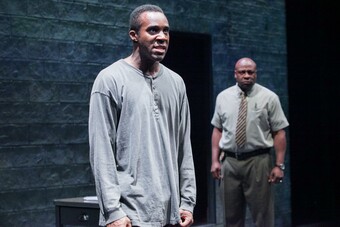

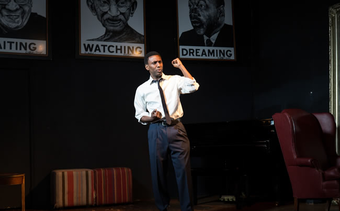

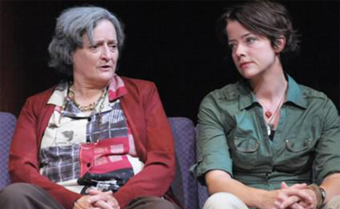
Comments
The article is just the start of the conversation—we want to know what you think about this subject, too! HowlRound is a space for knowledge-sharing, and we welcome spirited, thoughtful, and on-topic dialogue. Find our full comments policy here